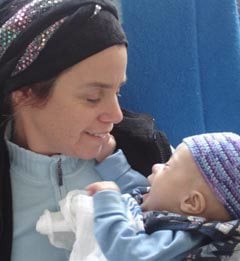"A baby is programmed to be loved by a mother. One baby, one mother. That's why babies fail to thrive in institutions. You and your baby start a song, and only the two of you have that song," says U.S.-born Chaya Ben Baruch, 52, who lives with her family in the northern Israeli city of Tzfat (Safed).
Chaya is the mother of six biological children, including a son, Avichai, aged 16, who has Down Syndrome. In addition, she and her husband Yisroel are also adoptive/foster parents to three more kids with Down Syndrome—two girls and a boy, Keren, Shalhevet, and Ori, ages 15, 10, and 2. The Ben Baruchs became parents to all three children Down syndome when the latter were tragically abandoned by their parents, at birth or shortly afterwards. The Ben Baruchs rescued these children from nearly-certain institutional fates, since in the past, few families in Israel have been willing to adopt children with Down Syndrome. (Another baby with Down Syndrome, Nachum, was fostered by the Ben Baruchs from the age of six days to the age of seven months. Sadly, this past spring, Nachum suddenly passed away.)
Now, Chaya Ben Baruch has launched an organization called Birkat Haderech to encourage women either to keep their babies with Down Syndrome, or to let Chaya help them find the babies a loving home. The organization keeps a list of families prepared to foster babies with Down Syndrome, and contacts them when there is a baby in need of a home.
She shrugs off all admiration for having adopted these children with disabilities. "The joy that we get is tremendous. People need to realize that unless there is a major medical problem, the every day care of a baby with Down Syndrome is no different than that of any other baby. It's just that their development takes longer. Longer to get out of diapers… longer to walk. But what is so bad about that, that you would leave them in the hospital?"
"People might think that we have sacrificed a lot to raise these children, and that it takes a lot of work and dedication. They are wrong," Chaya adds with a smile. "For every ounce of effort we give these children, they give back tenfold. The hugs given with their full selves, the kisses with all of their hearts plus more, the funny way they appreciate life. People see our children and know that some of them are our biological children and some are our adopted or foster-cared children. When people ask who is 'ours,' we often reply, 'They all are.'"
Chaya was born in Far Rockaway, New York, to American-born parents; her father's ancestors were Satmar Chassidim in Hungary. Her home was not observant, but she and her siblings attended a religious day school. At age seventeen, Chaya finished high school early and continued her studies at the State University of New York in Buffalo for two years. For her third year of college, she transferred to the University of Alaska in Fairbanks—intrigued by their marine mammal program, because she wanted to study maternal behavior in sea otters, which care for their young for a full year after birth.
At the University of Alaska, Chaya completed a degree in Biological Sciences and married her psychology professor. The couple had two sons and a daughter.
For every ounce of effort we give these children, they give back tenfold. The hugs given with their full selves, the kisses with all of their hearts, the way they appreciate life.
Chaya completed an educational degree and became a childbirth educator while running a Montessori school in her own home, with her own three toddlers attending. The couple divorced, but Chaya remained in Fairbanks, Alaska, so that the children could stay in touch with their father.
Chaya remarried, and her husband, Yisroel, worked as a youth counselor in the Alaskan prison system. Chaya gave birth to two more boys. At around the same time, both her father and her husband's father passed away. When her sixth child, a son, was born in 1991, the couple named him Avichai, which means "My father lives."
She took him home, nursed him and bonded with him emotionally before he was even diagnosed with heart problems as well as Down Syndrome. "When the doctors told me my baby needed open heart surgery, the Down Syndrome issue became secondary. I just wanted my baby to live. And it was a blessing that I bonded with him before I ever heard that he had Down Syndrome. I did not grieve for the 'perfect' child I expected. I learned to see a different 'perfect.'"
After Avichai's birth, Chaya began lighting Shabbat candles with her great-grandmother's candlesticks, which had reached the United States from Hungary with her father's mother, Ethel. Chaya had brought these precious candlesticks with her all the way from Far Rockaway to Alaska, when she was eighteen. "I remembered Grandma Ethel lighting Shabbat candles with these candlesticks and bringing down the light from the heavens into her home," says Chaya. "I also wanted to bring this light into our home on Friday nights."
After Avichai had open heart surgery at the age of three months, Chaya and her husband attended a conference for professionals and parents of people with disabilities. "We heard a story of twins who had died at the age of eighteen due to congenital illness. They had written a family journal, and through these entries, their mother could see how wonderful it was that each had the other. I came home from the conference and asked my husband if we could adopt another baby with Down Syndrome so that our child's life would be better."
The couple registered with a special adoption agency, at that time the only one dealing with the adoption of children with Down Syndrome. It was on Avichai's first birthday that Chaya received the phone call which brought Keren into their lives. A couple in Anchorage had given birth to a girl with Down Syndrome and didn't want to keep her.
"The biological parents came to bring us the baby. She was nine days old, gorgeous, blue-eyed, and blonde. They were joined by a four-year-old brother and a grandmother. They came at 10 a.m. and left at 2 p.m., and Keren has been ours ever since. I nursed her and Avichai together. They would hold hands as I held them."
Throughout this time, as the Ben Baruchs were becoming closer and closer to Jewish observance, they turned to Chabad emissaries in Anchorage, Rabbi Yossi and Esti Greenberg for advice, knowledge, and support on their spiritual journey. "Chabad is really the only thing Jewish going on in Alaska. Yossi, who comes from Bnai Brak, Israel used to joke that he was sent by the Lubavitcher Rebbe there to warm up the 'frozen chosen.' His wife Esti comes from Detroit. The only problem is that traveling from Fairbanks to Anchorage is an eight-hour drive. Still, we went to visit the Greenbergs as much as we could, and sometimes, they came up to us, too."
The Ben Baruchs began to investigate the possibility of living in Israel.
If only grandparents would say to the new parents who have had a baby with Down Syndrome, 'I'm so proud that G‑d chose you to have this child!"
Chaya's husband went on a pilot trip to Israel, searching for a community that the family could call home. They thought that kibbutz life would suit them. Yisroel went from kibbutz to kibbutz, but not one was willing to accept a family with two children with disabilities. Finally, Yisroel received a blessing from a rabbi in Jerusalem, who told them, "Don't worry about anything. Just come—you'll see miracles and wonders!"
In the summer of 1995, the Ben Baruchs arrived at the Absorption Center in Tzfat, in the north of Israel. "I remember our early days, with Yisroel toting Avichai (nearly four) in the backpack and holding Keren (nearly three) in his arms. People would cross the street so that they wouldn't catch whatever it was we had," recalls Chaya wryly. "Today, people cross the street just to say hello to my kids."
"When we were looking for a preschool for Avichai, we wanted him integrated into a mainstream kindergarten," Chaya recalls. "But no teacher in our area wanted to take him. Finally, I met Rachel. I told her I wanted her to take my son who has Down Syndrome. She said, without blinking, 'My pleasure!' Amazingly, her previous job had been to take care of abandoned babies with Down Syndrome in the hospital. G‑d has sent us some of the best emissaries over the years."
"If only grandparents would give encouragement to their children who have had a baby with Down Syndrome. If only they would say to the new parents, 'I'm so proud that G‑d chose you to have this child, to bring this tzaddik (righteous one) into our family'—because if everyone had this attitude, then no kindergarten attendant could say no to my child."

Two years after the family had come to Israel, Chaya was hanging the family laundry one morning when a friend mentioned that she had noticed a baby with Down Syndrome all alone in the Tzfat hospital. Before long, Chaya was visiting the baby girl throughout the day and forming a deep emotional attachment to her. Chaya held her, sang to her, fed her bottled formula, and signed the record card, "Ima (Mother)." Eventually, Chaya and Yisroel wanted to bring her into their home to join their family, where there already were two other siblings with Down syndrome, Avichai and Keren.
However, the Ben Baruchs now came up against the Israeli welfare department, which fought against the family adopting this baby. "The policy in Israel is that if you already have two children with disabilities, you can't adopt a third. Finally, they let me take her home temporarily. It was Chanukah time, so I called her Shalhevet (flame)." The welfare department continued their opposition, granting the family only one-year and two-year guardianship of Shalhevet. It was not until she was eight years old that the Ben Baruchs were awarded permanent guardianship.
In 2005, Chaya heard about Ori, a one-month-old baby boy with Down Syndrome abandoned by his mother in a hospital in the Tel Aviv region. Chaya began to visit this baby, too, in the hospital where he had been left. "One hour became two, two became four, and soon I found myself moving into the hospital to be near him twenty-four hours a day." Ori's mother wanted the Ben Baruchs to become her baby's foster parents, but the welfare department waged a bitter battle, suing Ori's mother for not putting him into an institution. "Miraculously, the judge we 'happened' to be assigned to, has his own daughter in an institution. He fully understood the difference between a loving, warm home and an institution, and awarded us permanent foster care of Ori."

Six months later, Ori underwent open heart surgery at Schneider Hospital in Petach Tikvah. Chaya had to leave all the other children with her husband in Tzfat and travel with Ori to the hospital. At the hospital, in the very next bed to Ori, was yet another abandoned baby, a girl with Down Syndrome who had been left alone in the hospital for five months. Chaya found a wonderful home for the baby—amazingly, in the home of the lawyer who had victoriously handled the legal battle for Ori.
In this way, the Birkat Haderech organization was born, its goal to encourage new mothers to keep their babies with Down Syndrome, or to help place these babies in loving foster homes.
The Ben Baruchs maintain a close connection with Chabad in Tzfat. Yisroel studies Tanya in the morning. Two-and-a-half-year-old Ori often comes with him to their morning prayer services, before meeting his school bus. Yisroel continues Torah learning throughout the day at a yeshiva for baalei teshuvah (newly religious).

"My husband's and my perspective is based on three questions, and their answer: Is G‑d perfect? Yes! Does He only do what's right and good for us? Yes! Does He make mistakes? No! Our mazel (good fortune) is that we are both in this together. Someone else had to give birth to our adopted/foster children, so that they could come to us."
Chaya advises parents of children with Down Syndrome to ignore conventional developmental milestones and accept their children at their own unique rates of progress. "Do I know how to love unconditionally? Absolutely." "Early on, I took the child developmental charts that said at what months a child should reach each milestone—and cut out the months. When my children with Down Syndrome developed at their own pace, I asked myself these questions, 'Did it take longer than normal? Yes. Did he need more support? Yes. Would I have loved him any less if he did not reach a milestone? No. Do I know how to love unconditionally? Absolutely.'"







Join the Discussion